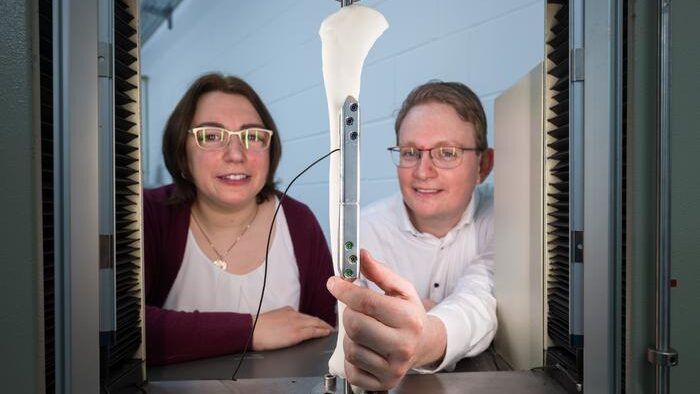Hannover Messe: Micro-massaging – ‘Artificial muscles’ help fractured leg bones heal better

Saarland University team develops innovative smart orthopaedic implants with ‘artificial muscles’ for real-time monitoring and promotion of bone healing, to be showcased at Hannover Messe.
Vest can detect earlier signs of heart muscle disease

A study led by UCL researchers suggests a novel ECGI vest capable of detecting early electrical abnormalities in the heart could significantly advance the early diagnosis of hypertrophic cardiomyopathy, potentially improving treatment and prevention strategies for this inherited condition.
Spinning, magnetic micro-robots help researchers probe immune cell recognition

Researchers at the University of Chicago have developed tiny, spinning micro-robots, known as hexapods, to study immune cells more effectively, potentially advancing the design of immunotherapies for cancer, infections, and autoimmune diseases.
Rooftop wheelchair deployment systems for cars boost independence

From Superinnovators 10/11/23. This article is in TLDR (Too Long Didn’t Read) format which is popular in the innovation community and provides a bullet summary of information. More info BraunAbility website You may also be curious about:
Look mom, no hands! Honda develops UNI-ONE hands-free mobility device

From Superinnovators 03/11/23. This article is in TLDR (Too Long Didn’t Read) format which is popular in the innovation community and provides a bullet summary of information. More info https://global.honda/en/tech/Hands-free_seated_personal_mobility_device_UNI-ONE/ You may also be curious about:
Plasma technology transforms microalgae for faster wound healing

From Flinders University 21/10/23 Researchers at Flinders University have taken a major step in the field of wound care by using plasma technology to ‘transform’ Spirulina microalgae into ultrathin bioactive coatings. The innovative approach uses argon atmospheric plasma jet technology to transform Spirulina maxima, the blue-green microalgae, into bioactive coatings which can tackle bacterial infections […]
New heart simulator to improve treatment of cardiac diseases

From Politecnico di Milano 19/09/23 A mathematical and computational model of the human heart entirely developed at Politecnico di Milano and designed for studying coronary artery disease. This is the focus of research published in the prestigious journal Nature Scientific Reports, entitled ‘A comprehensive mathematical model for cardiac perfusion’. The project was born from collaboration […]
Implantable insulin mini-factory with living cells promises injection-free control of diabetes

From Massachusetts Institute of Technology 19/09/23 One promising approach to treating Type 1 diabetes is implanting pancreatic islet cells that can produce insulin when needed, which can free patients from giving themselves frequent insulin injections. However, one major obstacle to this approach is that once the cells are implanted, they eventually run out of oxygen […]
Plastic peril: The chemical in your tupperware disrupts pregnancy in mice

From University of Illinois at Urbana-Champaign 05/09/23 We are constantly exposed to phthalates in our environment through plastic products such as storage containers, medical devices, packages, fabrics, and toys. Specifically, di-isononyl phthalate is inevitably becoming a part of our lives. Unfortunately, the impact of DiNP on the establishment and maintenance of pregnancy is largely unknown. […]
Paper drinking straws may be worse for the environment than plastic versions – innovation opp.

From Taylor & Francis Group 25/08/23 Long-lasting “forever chemicals”, which can cause damaging health issues, found in 18/20 brands of paper straws “Eco-friendly” paper drinking straws contain long-lasting and potentially toxic chemicals, a new study has concluded. In the first analysis of its kind in Europe, and only the second in the world, Belgian researchers […]
